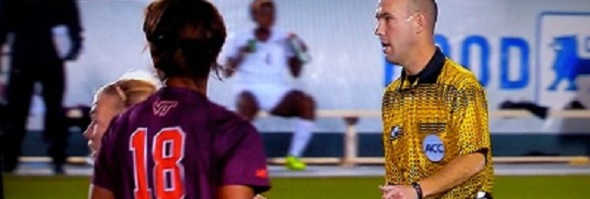
All in the Details
December 3, 2015
By Brent Sorg
Collegiate official & MHSAA coach
In my experience as both an official and coach, my partners or officials assigned to work my match are judged the moment we meet and make contact. That is human nature.
What is important is to make that first impression a positive one. At first contact, when greeting an administrator, coach or fellow official, look the person in the eye when shaking hands and be sincere in your greeting. When the person speaks, look them in the eye and listen. Sounds simple, yet I’ve seen many fail at this task and thus set themselves up for a difficult match.
The next moment of impact is the conversations that take place. It is totally acceptable to have a laugh and a joke, but be sure the environment and timing is right. You may ask, “Who is to judge when the time is correct?” It is all a feeling – a sort of sixth sense. I have witnessed on numerous occasions during the pregame check-in where officials “dig their own grave” by telling the players how they are going to call the game. Then they continue with how they will only talk to the captain. That is nonsense! In the business of managing people, it is imperative to deal with everyone involved in the game.
Once the match begins, the next task to strive for is not looking at the ball the entire time. From the first class I took on officiating, I was told the ball never commits a foul. In my 25 years, this is still true. Look ahead, scan the field, watch the players battling for position prior to the ball arriving. If one of the backs has the ball at his feet and is under zero pressure, there is no need to watch him pass the ball. Look instead at the forward checking back who is tightly marked by an opposing defender.
The game continues to evolve with faster, smarter, and more creative players. The coaches are implementing tactics to create every advantage possible. As you go about the game as the center official, don’t just judge fouls/non-foul moments, but expand your knowledge. What are the tendencies of certain players on the field? Are teams looking to build up or are they using a more direct style of play? This will help with your positioning and anticipating movement.
Almost every match has at least one defining moment that you as the referee must have the courage to deal with. It is often referred to as the “moment of truth.” It could mean you rule it is not a foul and don’t even have to blow the whistle, but you must deal with dissent. Or it could mean a stern talking to the player, issuing a caution, or showing the red card. Reflecting on the mentors I have had over the years and those I still look up today, I think about a consistent theme heard from all: Make sure you get something out of each caution or send-off.
Be brave. Make the tough decisions. Remember, the players are the ones who commit fouls forcing us to make certain decisions.
Many of you watch professional games on television, and I think we can all learn from them. In particular, I think the EPL (English Premier League) referees do an excellent job of isolating the guilty player, explaining the decision, and then showing the card. All while looking the player square in the eyes.
Your mindset to a match should be one of teamwork and one that fosters harmony with the players on the pitch. Not an “us vs. them” mentality.
Finally, be willing to admit a mistake. You are not perfect! You are a human being. It is OK to admit an error, but be genuine about it. Be sympathetic when appropriate. Be firm yet fair.
Most importantly, enjoy.
Sorg is a former National Referee and current NISOA Referee (ACC, Big Ten, Big East, Horizon, Conference USA, MAC); he also is a high school boys head coach who recently concluded his 11th season.

The Official View: Official Thanks
By
Brent Rice
MHSAA Assistant Director
September 13, 2021
A return to the start of another school year means a return to school sports contests – and what separates those contests from simply being kids playing a pick-up game is the attendance of assigned officials.
The steady declining trend of MHSAA registered officials was accelerated last year in the complicated world of facemasks, testing and late cancellations, when the MHSAA lost nearly 15 percent from its previous year’s ranks. Now that we have returned to some (relative) normalcy, it’s more important than ever to recognize those officials who allowed athletes to play a season last year and to welcome back those who had to take the season off.
A new program being instituted in Detroit’s Catholic High School League does just that. This year, CHSL schools will be presenting officials throughout the season with “thank you” cards to express their gratitude for the dedication and hard work these individuals provide to ensure students have an opportunity to compete.
These gestures of appreciation serve to retain officials by recognizing how important they are to the game, and to recruit new officials by showing that officiating is an honorable avocation that allows them to serve the community and stay in athletics.
The MHSAA will be rolling out a new Game Day Ambassadors Program in Spring 2022 which will include similar ideas for increasing the morale of officials and developing long-lasting, cooperative relationships between schools and officials. Some of the ways outlined include:
► “Thank an Official” events where the team and spectators recognize the officials in their community.
► Adding alternative “compensation” to officials by occasionally providing promotional items, small gift certificates from local businesses and eateries, and snacks and refreshments in the locker room.
► Presenting mid-game sportsmanship PSAs.
► Regularly reviewing officials game fees to ensure that officials are being fairly paid for their work.
The most surefire way to recruit and retain officials is to treat them with respect. The No. 1 reason given for individuals leaving officiating is negative behavior and treatment by adult spectators and coaches. These folks that give up their time to officiate school contests do so by scheduling around their day jobs, family commitments and other personal responsibilities. They are required to make real-time, split-second decisions in a world filled with zoomed in and slow-motion video, social media and camera phones at every turn, but without the luxury of replay review. And in the end, they aren’t paid nearly the amount as their college and professional counterparts.
Maintaining reasonable perspective and expectations is a core value in educational athletics … and it should be with the officials as well.
Thank you, MHSAA officials, for your commitment to school sports, and thank you to the Catholic League and others willing to acknowledge the same.
It’s Official!
Postseason Assignments: A number of changes have been instituted for postseason consideration over the past few years. Notably this year, officials in most sports must opt into tournament consideration. This means officials this season for football, soccer and volleyball must submit their availability in the MHSAA website – otherwise the default is that they are unavailable. This is in addition to other postseason requirements such as completion of the rules meeting, the tournament exam and submission of the official’s regular-season schedule through the MHSAA website. These requirements are due by Sept. 15 for soccer and volleyball, Sept. 22 for football and Oct. 6 for girls swimming & diving.
Officials Review Committee: The Officials Review Committee is scheduled to convene the first week of October to discuss issues and make proposals. Agenda items this year include volleyball and swim uniforms, video review, officials fees, sport committees including officials, registration fee deadlines and the basketball District officials assignment process. An update on these subjects will be provided in next month’s Official View.
Know Your Rules
VOLLEYBALL Team A’s server steps on the end line before contacting the ball in her serve. As she makes contact with the ball, CB (center back) and RB (right back) on Team R are overlapping.
Ruling: When the server illegally contacts the ball while in contact with the floor on the end line, the ball remains dead. Even though Team R is out of position on the play, the ball never became live, and so the foot fault is enforced and it is a loss of rally/point against Team A.
It’s Your Call
FOOTBALL This month’s It’s Your Call comes on a play from the gridiron. As Team A’s lead blocker comes around the end, Team B’s No. 17 moves up to take him on at the A 32-yard line. The ballcarrier is sprung for another eight or nine yards before being tackled. What’s the call?

